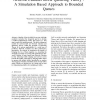Free Online Productivity Tools
i2Speak
i2Symbol
i2OCR
iTex2Img
iWeb2Print
iWeb2Shot
i2Type
iPdf2Split
iPdf2Merge
i2Bopomofo
i2Arabic
i2Style
i2Image
i2PDF
iLatex2Rtf
Sci2ools
126
click to vote
IWQOS
2004
Springer
2004
Springer
Network calculus meets queueing theory -a simulation based approach to bounded queues
— Quality of Service (QoS) is an area with high academic curiosity. Our long-term goal is to develop a unified mathematical model. This paper is a first step towards this ambitious goal. The most widespread models for network QoS are Network Calculus and Queueing Theory. While the strength of Queueing Theory is its proven applicability to a wide area of problems, Network Calculus can offer performance guarantees. We analyse by simulation the benefit of bringing the two of them together, i.e., bounding the stochastic processes of a queue with methods from Network Calculus. A basic result from Network Calculus is that enforcing traffic shaping and service curves bounds the buffer. This leads to denying buffer states in queues with infinite buffer. Specifically, we analyse what happens with the probability mass of such buffer states. Finally, we discuss how our results can be used for dimensioning buffers for multiplexed traffic.
Related Content
| Added | 02 Jul 2010 |
| Updated | 02 Jul 2010 |
| Type | Conference |
| Year | 2004 |
| Where | IWQOS |
| Authors | Krishna Pandit, Jens Schmitt, Ralf Steinmetz |
Comments (0)

